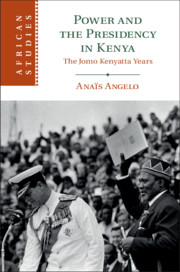Book contents
- Power and the Presidency in Kenya
- African Studies Series
- Power and the Presidency in Kenya
- Copyright page
- Dedication
- Contents
- Acknowledgments
- Introduction
- 1 Kenyatta’s Stateless Political Imagination
- 2 From Prison to Party Leader, an Ambiguous Ascension (1958–1961)
- 3 Kenyatta, Land, and Decolonization (1961–1963)
- 4 Independence and the Making of a President (1963–1964)
- 5 Kenyatta, Meru Politics, and the Last Mau Mau (1961/3–1965)
- 6 Taming Oppositions: Kenyatta’s “Secluded” Politics (1964–1966)
- 7 Ruling over a Divided Political Family (1965–1969)
- 8 “Kenyatta Simply Will Not Contemplate His Own Death” (1970–1978)
- Conclusion
- Sources
- Bibliography
- Index
- African Studies Series
1 - Kenyatta’s Stateless Political Imagination
Published online by Cambridge University Press: 11 October 2019
- Power and the Presidency in Kenya
- African Studies Series
- Power and the Presidency in Kenya
- Copyright page
- Dedication
- Contents
- Acknowledgments
- Introduction
- 1 Kenyatta’s Stateless Political Imagination
- 2 From Prison to Party Leader, an Ambiguous Ascension (1958–1961)
- 3 Kenyatta, Land, and Decolonization (1961–1963)
- 4 Independence and the Making of a President (1963–1964)
- 5 Kenyatta, Meru Politics, and the Last Mau Mau (1961/3–1965)
- 6 Taming Oppositions: Kenyatta’s “Secluded” Politics (1964–1966)
- 7 Ruling over a Divided Political Family (1965–1969)
- 8 “Kenyatta Simply Will Not Contemplate His Own Death” (1970–1978)
- Conclusion
- Sources
- Bibliography
- Index
- African Studies Series
Summary
Analysing Kenyatta’s writings and speeches, chapter 1 uncovers how Kenyatta imagined a postcolonial society. It argues that Kenyatta never imagined state authority as an inclusive authority for all. Neither did he preview a creative role for the state, or for himself. This lack of nationalist perspective was inherent in his Kikuyu ethics (the protection of land property and the civic virtues that promoted land productivity). Although it was reinforced by British colonization, Kenyatta avoided reflecting on how he could reconcile Kikuyu history, which he praised, with a social order disrupted by colonialism. The chapter first attempts to situate the concept of the “family” in Kenyatta’s early writings. It then explores the intellectual legacy of his writings after independence, and shows how Kenyatta was at pains to enlarge and adapt his moral discourse to the new Kenyan nation. After examining how his politics were influenced by his discourse on moral virtues, the chapter emphasises Kenyatta’s constant care for family politics, and his mistrust for any nationalist ambitions he saw as betraying his “tribal” origins.
- Type
- Chapter
- Information
- Power and the Presidency in KenyaThe Jomo Kenyatta Years, pp. 38 - 65Publisher: Cambridge University PressPrint publication year: 2019

